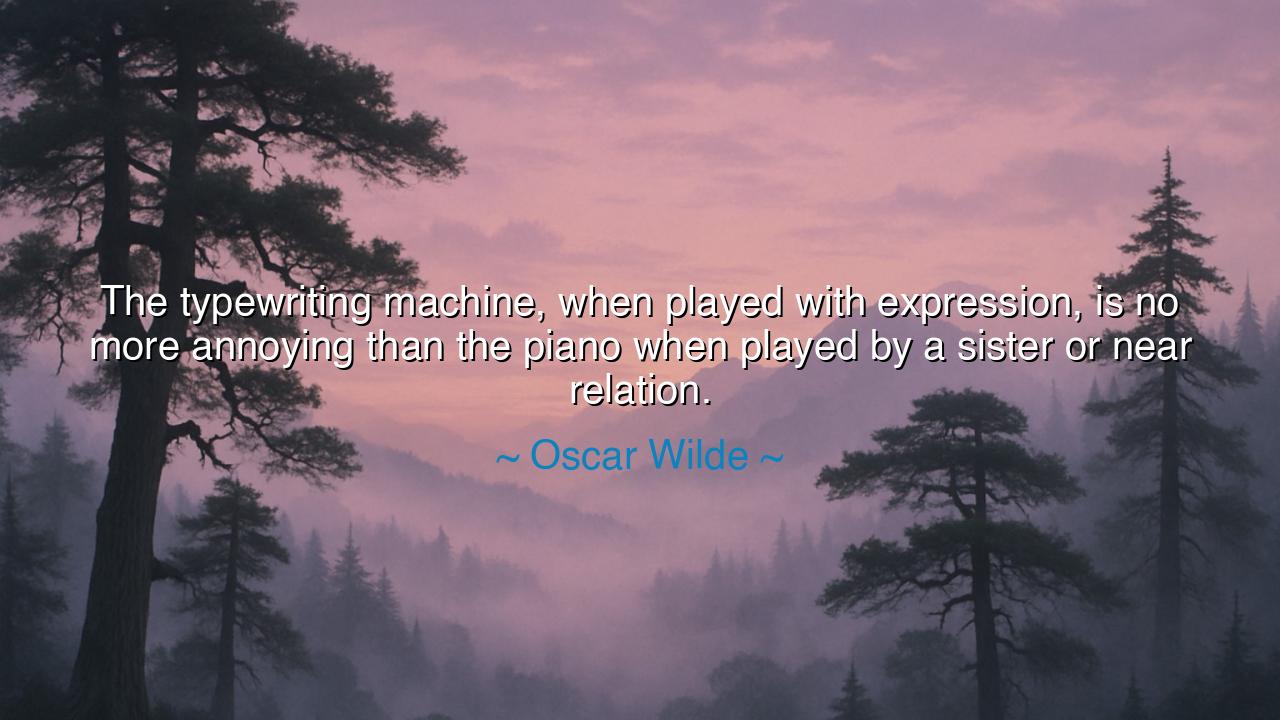
The typewriting machine, when played with expression, is no more
The typewriting machine, when played with expression, is no more annoying than the piano when played by a sister or near relation.






Hear the wit of Oscar Wilde, cloaked as ever in irony, when he declared: “The typewriting machine, when played with expression, is no more annoying than the piano when played by a sister or near relation.” In his jest lies a deeper wisdom, for Wilde did not merely mock the sounds of the typewriter; he revealed the tension between the birth of technology and the traditions of art, between the clang of progress and the harmony of culture.
The typewriter, when it first appeared in the 19th century, was seen by many as crude and noisy, its clatter a disruption to the quiet of the home and the dignity of the library. Yet, just as the piano in countless households was played imperfectly by relatives—often with more enthusiasm than skill—the typewriter too could be approached as an instrument, its rhythms not unlike music. Wilde’s brilliance lies in equating the two: both machines capable of beauty when wielded with care, both sources of irritation when handled poorly.
The deeper meaning here is that every new invention meets resistance. The typewriter was mocked for its sound, just as early railways were feared for their smoke, or electricity distrusted for its invisible power. Wilde’s words remind us that what seems strange or annoying at first may in time become familiar, even beloved. The very clatter of the typewriter, once derided, later came to symbolize productivity, creativity, and the written word democratized. So too, the piano, once a novelty in middle-class homes, became a symbol of refinement and culture.
Consider the life of Mark Twain, who was one of the first authors to submit a typed manuscript. To his contemporaries, it seemed almost scandalous that literature, the noble work of pen and ink, should be entrusted to a machine. Yet Twain saw the typewriter as a tool to multiply his words, to quicken his labor, and to spread his ideas. Just as the piano extended the human voice into melodies, the typewriter extended human thought into durable form. Both, when “played with expression,” could create lasting art.
But Wilde’s wit also hides a barb: he suggests that whether it be typewriter or piano, the fault lies not in the tool but in the operator. A poorly typed letter is no worse than a poorly played sonata; both offend not because of the machine, but because of the lack of skill or taste in its use. Thus the lesson: technology and art alike demand practice, sensitivity, and care. Without these, every invention becomes an irritant; with them, even clattering keys may become music.
So, O listener, take this wisdom into your own age. The clamor of modern devices—the buzzing of phones, the tapping of keyboards, the hum of servers—may seem a constant annoyance. Yet remember Wilde’s lesson: it is not the machine itself that is to blame, but how we wield it. With intention, grace, and restraint, even the noisiest inventions can become instruments of beauty and purpose.
Practical steps follow: approach your tools not as nuisances, but as instruments awaiting skill. Practice discipline with your machines—whether writing, speaking, or playing—so that what emerges from them uplifts rather than disturbs. Do not scorn new technologies for their unfamiliar noise; instead, learn to play them with expression. For in every clatter of keys, as in every note of music, lies the potential for art.
Thus, remember Oscar Wilde’s playful yet profound truth: “The typewriting machine, when played with expression, is no more annoying than the piano.” What seems disruptive today may, in time, be remembered as music. The key lies not in the invention, but in the human hand that guides it.






AAdministratorAdministrator
Welcome, honored guests. Please leave a comment, we will respond soon